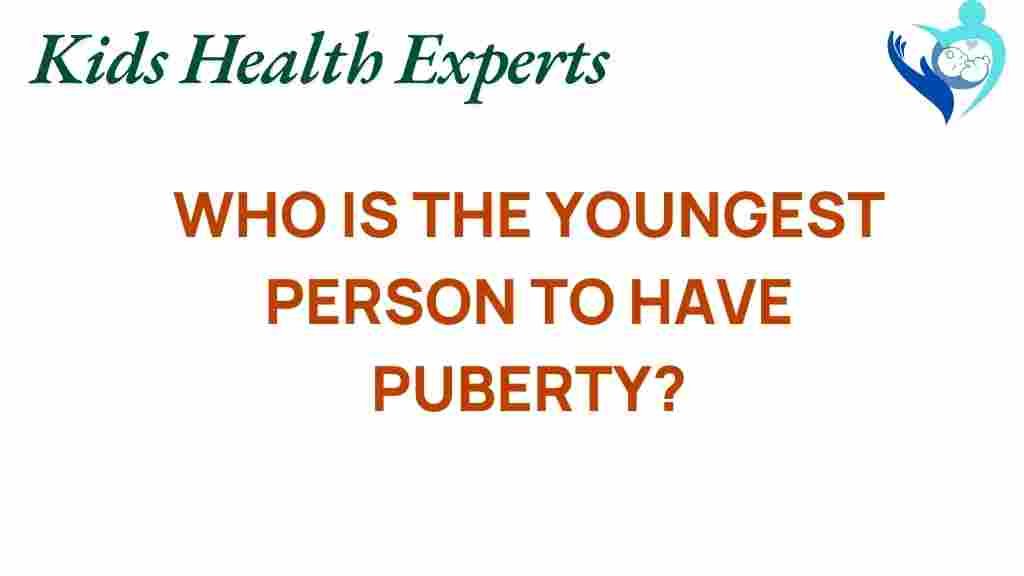The Surprising Truth: Who is the Youngest Person to Experience Puberty?
Puberty is a pivotal phase in child development, marking the transition from childhood to adolescence. It encompasses a series of biological, psychological, and social changes that significantly shape an individual’s life. While most people associate puberty with the teenage years, some children experience this complex process at surprisingly early ages. In this article, we will explore the youngest known individuals to undergo puberty, the implications of early maturation, and the health and psychological impacts that accompany this phenomenon.
Understanding Puberty: A Brief Overview
Puberty is characterized by a range of physical, hormonal, and emotional changes. The average age for the onset of puberty is:
- Girls: Between ages 8 and 13
- Boys: Between ages 9 and 14
However, some children may experience early maturation, raising questions about the biological and environmental factors that contribute to this phenomenon.
The Youngest Person to Experience Puberty
One of the most notable cases of early puberty is that of a young girl named Lenneah P. , who began experiencing signs of puberty at just **three years old**. This astonishing case has drawn attention from medical researchers and parents alike, leading to discussions about the biological and psychological implications of such early maturation.
Lenneah’s experience is not an isolated incident. There have been numerous documented cases of children starting puberty at extraordinarily young ages, often due to conditions such as:
- Precocious puberty
- Hormonal imbalances
- Genetic factors
Biology of Early Maturation
The biology behind early puberty involves complex interactions between hormones and genetic factors. Key hormones that play a role in puberty include:
- Gonadotropin-releasing hormone (GnRH): Triggers the release of sex hormones.
- Luteinizing hormone (LH): Stimulates the production of sex hormones in the ovaries and testes.
- Follicle-stimulating hormone (FSH): Supports the growth of ovarian follicles and sperm production.
In children like Lenneah, the hypothalamus may activate these hormonal pathways earlier than usual, leading to the onset of secondary sexual characteristics such as:
- Breast development in girls
- Testicular enlargement in boys
- Pubic hair growth
The Psychological Impact of Early Puberty
Experiencing puberty at a young age can significantly affect a child’s mental health and emotional development. Some potential psychological impacts include:
- Increased anxiety and stress: Early maturing children may feel out of place or overwhelmed compared to their peers.
- Social challenges: With physical changes, children may face bullying or social exclusion.
- Body image issues: Young children may struggle with their self-image as they deal with adult-like bodies at an early age.
Health Implications of Early Puberty
While early maturation can be concerning from a psychological perspective, it can also lead to various health implications. Some of these include:
- Increased risk of chronic diseases: Early maturing girls, for instance, may have a higher risk of obesity and related health issues.
- Potential for hormonal imbalances: Early puberty might indicate underlying hormonal disorders that need medical attention.
- Emotional and behavioral problems: Studies have shown that early maturing children are at a higher risk of developing issues such as depression and anxiety.
Medical Research and Early Puberty
Recent medical research has delved into the causes and consequences of early puberty. Studies have identified several factors that may contribute to this phenomenon, including:
- Genetics: Family history of early maturation can play a significant role.
- Obesity: Higher body mass indexes (BMIs) in children have been linked to earlier onset of puberty.
- Environmental factors: Exposure to endocrine-disrupting chemicals found in plastics and other materials can influence hormonal development.
For more information on the biological mechanisms of puberty, you can visit this medical research article.
Step-by-Step Process of Managing Early Puberty
If you suspect that your child is experiencing early puberty, it is crucial to consult with a healthcare provider. Here’s a step-by-step process to address this issue:
- Consult a Pediatrician: Schedule an appointment with a doctor who specializes in child development.
- Medical Evaluation: A thorough evaluation may include physical examinations, blood tests, and imaging studies to assess hormonal levels.
- Discuss Treatment Options: Depending on the findings, treatment options may include hormone therapy or lifestyle changes.
- Psychological Support: Consider counseling or therapy for your child to help them cope with the emotional impact of early maturation.
- Monitoring: Regular follow-ups with the healthcare team to monitor your child’s development and make necessary adjustments to their treatment plan.
Troubleshooting Tips for Parents
As a parent, navigating the complexities of early puberty can be challenging. Here are some troubleshooting tips to help you support your child:
- Open Communication: Encourage your child to express their feelings and concerns about their body changes.
- Educate Yourself and Your Child: Learn about puberty together to demystify the process and reduce anxiety.
- Promote Healthy Habits: Encourage a balanced diet and regular physical activity to support overall health.
- Seek Professional Help: Don’t hesitate to reach out for professional guidance if you notice concerning behaviors or emotional distress.
Conclusion
Understanding the journey of puberty, especially when it occurs at an unusually young age, is essential for parents, educators, and healthcare providers. Children like Lenneah P. remind us of the diverse experiences of maturation and the importance of addressing both the biological and psychological aspects of early puberty.
Through continued medical research, awareness, and support, we can better equip ourselves to guide children through this critical phase of development. If you suspect your child is experiencing early puberty, take proactive steps to ensure they receive the care and support they need during this transformative time.
For more information on child development and puberty, visit our resource page.
This article is in the category Conditions and created by KidsHealthExperts Team
